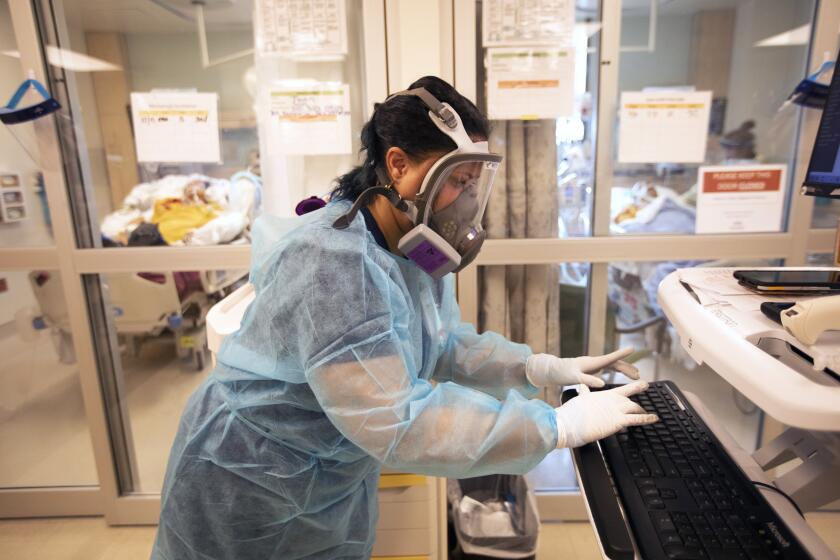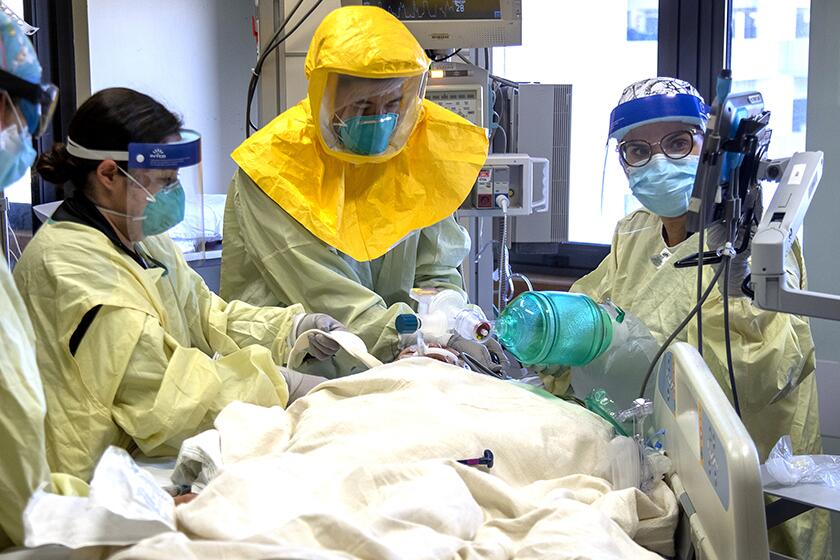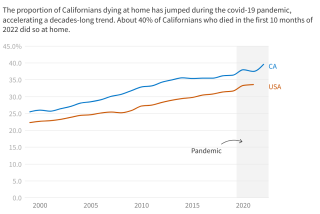Some L.A. County mortuaries and funeral homes simply have no more room for the dead
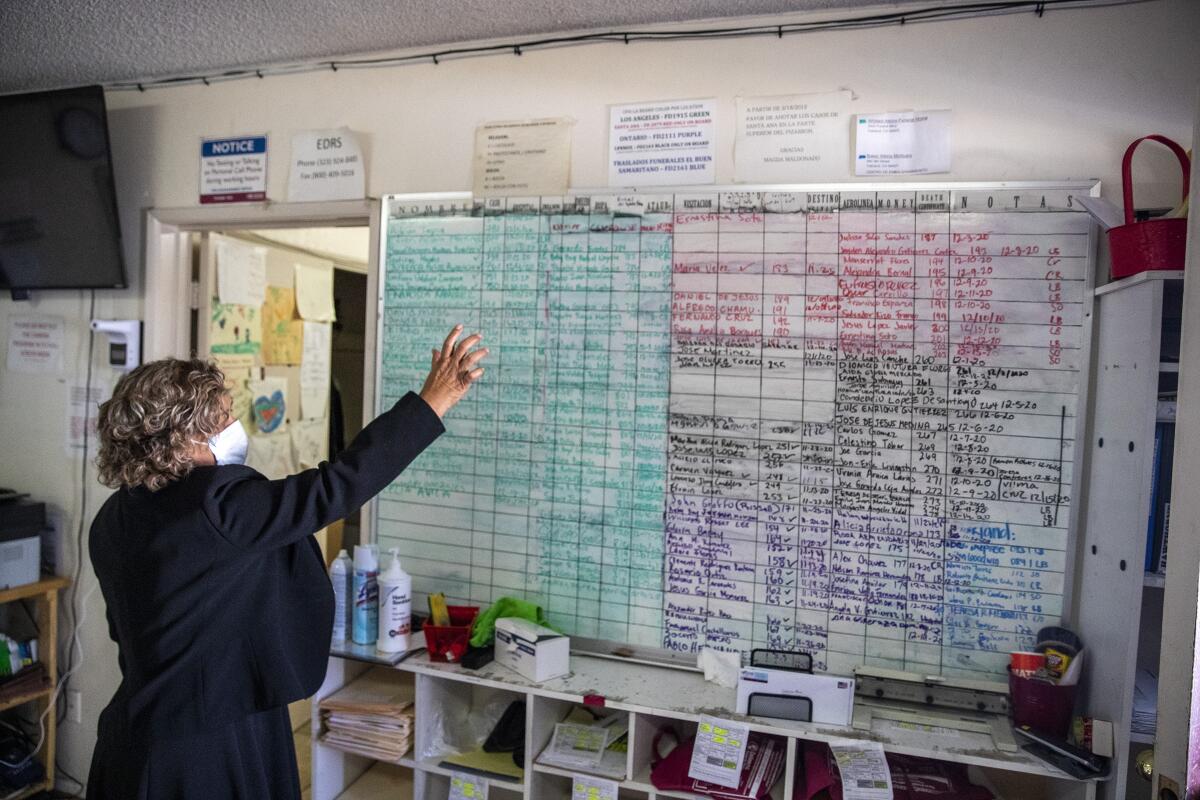
- Share via
As hospitals in Southern California fill with people infected with COVID-19, so too are the places where a number of those patients end up. Mortuary and funeral home operators say they are having to turn away bereaved families because they don’t have the capacity to handle more bodies.
“The thing that’s never happened to me, even since the beginning of this,” said Rob Karlin, the owner and funeral director of Los Angeles Funeral Service in Culver City, “is I’m now saying to people who are calling me, ‘I’m sorry. We can’t accommodate you. We’re at capacity.’”
Karlin founded a casket company in 1996 and the funeral service in 2005. “I’ve never been in a position where I had to say, ‘I’m sorry. I can’t help you,’” he said.
Hospitals in lower-income, densely populated and nonwhite communities face the greatest challenge in providing care, a Times data analysis finds.
In Los Angeles County, 7,181 people were hospitalized Tuesday with COVID-19, a single-day record, according to the county health department. A fifth of those patients were in intensive care units. Those hospitalizations represent a more than threefold increase from the peak of an earlier virus surge in July, the health department said.
Los Angeles County recorded 227 deaths from COVID-19 on Tuesday.
Karlin attributed his capacity issues both to the rising caseload and to a slowdown in the process of burying the dead. Obtaining death certificates, retrieving bodies from the coroner, embalming them — “everything is taking longer,” he said.
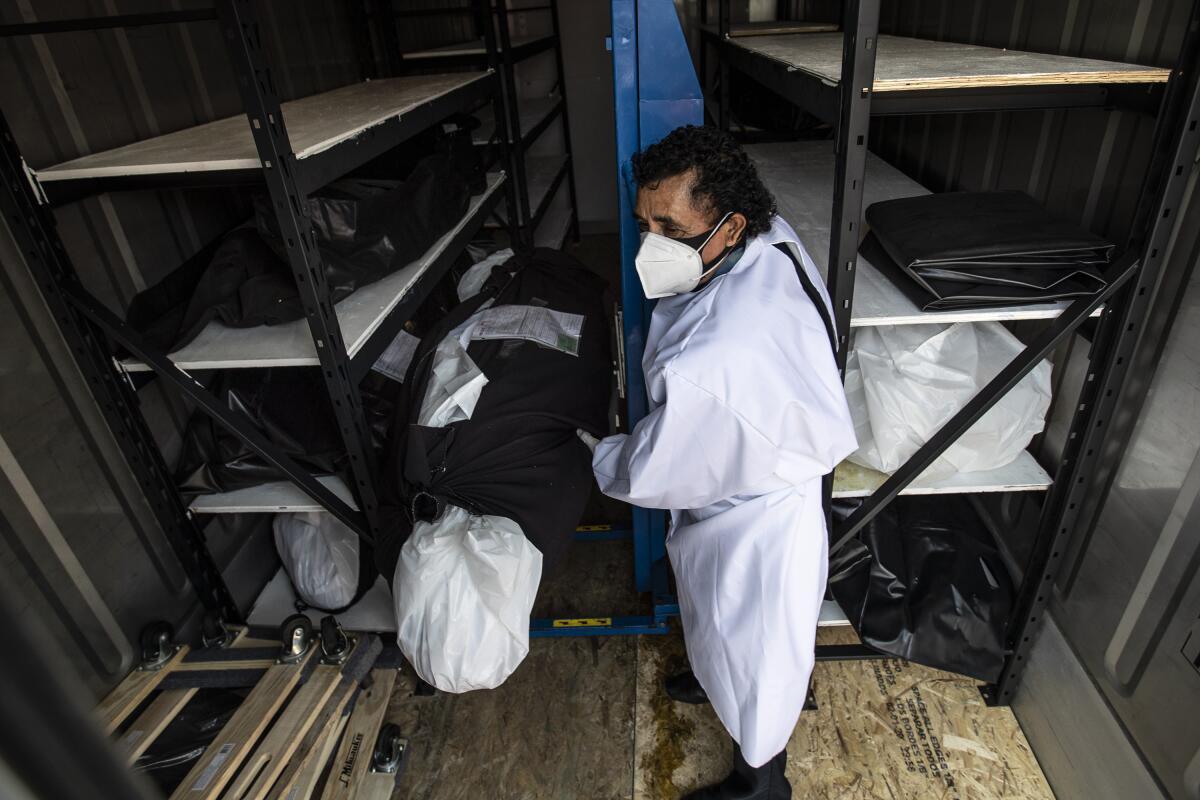
Embalmers, he added, are treating every body as if it had been infected with COVID-19. “They’re taking extra precautions and using a lot of bleach,” he said. “There’s an uncertainty about how long it’s dangerous on a dead body. I don’t know. There’s so much unknown.”
Jennifer Bagues, the general manager of Felipe Bagues Mortuary in Boyle Heights, had to start turning away families this week. Her family’s small mortuary on 1st Street, which was founded by her great-grandfather, can fit no more than 20 bodies.
“We’re overwhelmed,” she said.
The number of people with COVID-19 inside ICUs has broken records for 16 consecutive days.
Bagues estimates that 75% of the calls she’s fielded in the last two weeks have been from families whose relatives have died of COVID-19. Lately, she’s realized some families are returning to bury a second loved one. Bagues scheduled a service this weekend for a husband and wife who both died from COVID-19, the fifth one she’s arranged since the pandemic began, she said.
Bagues said bureaucratic slowdowns had contributed to capacity issues as the mortuary had to house the bodies of people needing to be sent back to their home countries for a longer period of time. Although she can obtain most permits and certificates online, the paperwork needed to ship a body out of the country must be filed in person or by mail, she said. Normally, county buildings would be open and an employee could deliver the paperwork in person, but with the pandemic closing government offices, she’s forced to send the forms in the mail. The process has slowed to a crawl, but the bodies keep coming.
Telling grieving families she can’t take their loved ones is “heartbreaking,” Bagues said. “I think my dad would be turning over in his grave if he heard me saying that.”
At St. Francis Medical Center in Lynwood, morticians from funeral homes can’t come fast enough to remove bodies from the hospital morgue, said Scott Byington, a nurse at the hospital. Morticians visit the hospital multiple times a day to pick up as many bodies as they can, but limited space at the funeral homes has created a backlog. Any open spots are quickly filled with more deceased patients, Byington said.
At the beginning of a recent shift, Byington was told there were enough gurneys for nine more people in the hospital morgue. Six hours later, several patients had died and the morgue was at capacity, he said.
“We were calling the mortuary to come and take what you can,” he said. “Our morgue has been full all the time.”
Mortuary staff have said they can only accept bodies for cremation, since that takes up less space, Byington said. It is a grim index of the pandemic’s toll.
“I never would’ve thought I’d see anything like this,” he said.
The Los Angeles County medical examiner-coroner will begin to help store bodies because there are too many at hospitals and mortuaries, County Supervisor Hilda Solis said Wednesday.
“It’s such a grim reality,” Solis said, “but I’m compelled to say this because it’s gotten to the point where we need to show the true toll of what this virus has taken and can take.”
Starting Monday, six members of the California National Guard are expected to help the medical examiner’s office handle the high number of bodies. They will support management and administrative functions through the end of January, to be extended if needed, Solis said.
The county morgue currently has room for another 386 bodies, “certainly more than enough, we would hope, to meet the needs” of local public hospitals, said Dr. Christina Ghaly, the county health services director.
Ghaly pleaded with people to stay home and avoid gathering for New Year’s celebrations.
“We absolutely have to get this surge under control,” she said. “If we don’t, then the beginning of 2021 will be worse than the end of 2020.”
More to Read
Sign up for Essential California
The most important California stories and recommendations in your inbox every morning.
You may occasionally receive promotional content from the Los Angeles Times.
